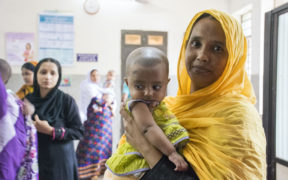Author:
Kate Rademacher
Senior Technical Advisor (Product Development and Introduction), FHI 360
Kate H. Rademacher is an innovative public health leader with 18 years of experience in family planning program design, management, and evaluation. She currently works on the Product Development and Introduction team in the Global Health, Population and Nutrition group at FHI 360, where she co-leads FHI 360’s family planning strategy and supports the development and introduction of new and underutilized contraceptives in low-resource settings. She is the project director for the Learning about Expanded Access and Potential (LEAP) Initiative and oversees a portfolio of activities under the USAID-funded Envision FP and Innovate FP projects.

On November 17‒18, 2020, a virtual technical consultation on contraceptive-induced menstrual changes (CIMCs) convened experts in the fields of family planning and menstrual health. This meeting was coordinated by FHI 360 through the Research for Scalable Solutions (R4S) and Envision FP projects with support from the U.S. Agency for International Development (USAID).
Listen to “Inside the FP Story”
Grab a cup of coffee or tea and listen in on honest conversations with family planning program experts around the world as they share what has worked in their settings — and what to avoid — in our podcast series, Inside the FP Story.
Click on the image above to visit the podcast page or on your preferred provider below to listen to Inside the FP Story.
Stay Updated
with the latest trending news
About
Knowledge SUCCESS is a five-year global project led by a consortium of partners and funded by USAID’s Office of Population and Reproductive Health to support learning, and create opportunities for collaboration and knowledge exchange, within the family planning and reproductive health community.
Contact
Johns Hopkins Center for Communication Programs
111 Market Place, Suite 310
Baltimore, MD 21202 USA
Contact Us
This website is made possible by the support of the American People through the United States Agency for International Development (USAID) under the Knowledge SUCCESS (Strengthening Use, Capacity, Collaboration, Exchange, Synthesis, and Sharing) Project. Knowledge SUCCESS is supported by USAID’s Bureau for Global Health, Office of Population and Reproductive Health and led by the Johns Hopkins Center for Communication Programs (CCP) in partnership with Amref Health Africa, The Busara Center for Behavioral Economics (Busara), and FHI 360. The contents of this website are the sole responsibility of CCP. The information provided on this website does not necessarily reflect the views of USAID, the United States Government, or the Johns Hopkins University. Read our full Security, Privacy, and Copyright Policies.













